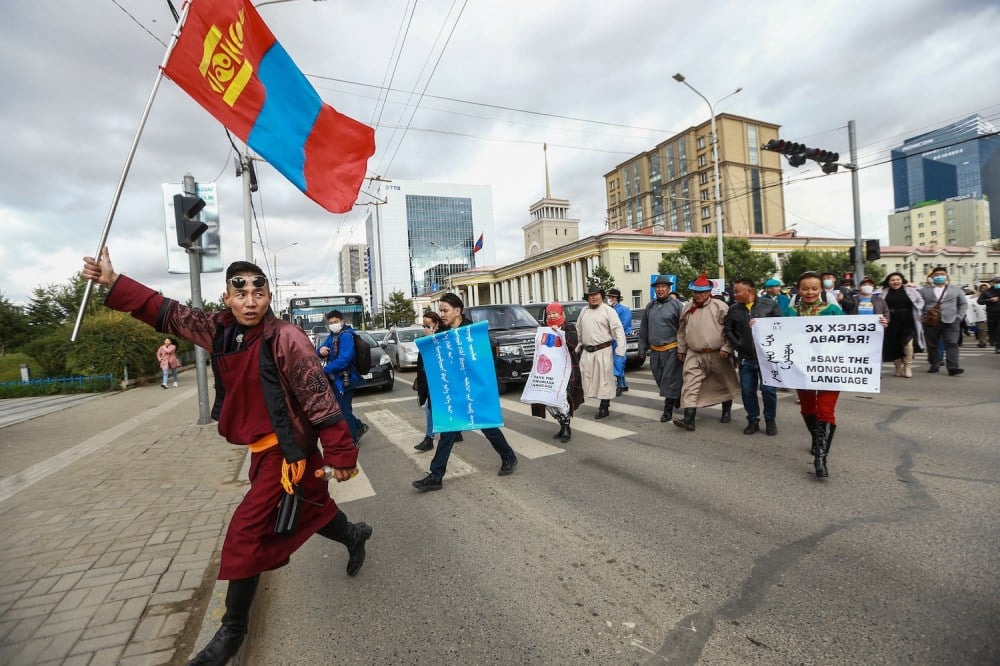Copyright Foreign Policy

Welcome to Foreign Policy’s China Brief. The highlights this week: We take a look at the increasingly strained history of ethnic ties between China and Mongolia, Japan’s new prime minister makes clear her stance on Taiwan, and China shines at the annual U.N. climate conference. A Brief History of China-Mongolia Relations China’s northern neighbor Mongolia is facing a constitutional crisis after its Supreme Court ruled last month that the parliament’s mid-October no-confidence vote against the prime minister was improperly conducted—worsening the ongoing clash between parliament and the country’s president. But the turmoil won’t affect most ethnic Mongols, who face an entirely different set of political problems. That is because around 6.3 million Mongols live in China, mostly in the region of Inner Mongolia. That’s almost twice the 3.5 million people living in the country of Mongolia (or as it was once called, Outer Mongolia). China’s Mongol population also far outnumbers that of ethnic Kazakhs and Uzbeks. So, why are there so many Mongols in China? The real question is why there aren’t more. Inner and Outer Mongolia were regional designations created under the Qing dynasty (1644-1911). Maps of Qing territory show that, unlike those of earlier empires, its borders and claims roughly correspond to present-day China, except for Outer Mongolia and Siberia, which were gradually carved off by Russia. The Qing rulers—who were Manchu, a northern people ethnically related to the Mongols—sought to preserve Mongolia’s ecological and cultural integrity, initially prohibiting Han Chinese from settling there. However, by the 19th century, overpopulation and over-farming in the south drove Han migrants north. The collapse of Qing power after the 1850 Taiping Rebellion dealt a final blow, resulting in a surge of Han settlers arriving in Inner Mongolia. The new settlers purchased land from Mongol nobles, undermining the traditional pastoral rights of ordinary Mongols and fueling decades of violent ethnic conflict. Resistance leaders such as Dambijantsan waged long campaigns against Qing rule, but the demographic and economic numbers were against them. In contrast, Outer Mongolia remained largely untouched. When the Qing dynasty finally fell in 1911, Outer Mongolia declared independence as Mongolia under the Bogd Khan, the local equivalent of the Dalai Lama. Chinese forces invaded Mongolia in 1919 but were driven out by the White Russian warlord Roman von Ungern-Sternberg. (Hey, somebody wrote a book about him!) The fear that the country would turn into a center of resistance prompted the Bolsheviks to invade in 1921, which eventually made Mongolia the first Soviet satellite state. Paradoxically, 70 years of Soviet oppression helped preserve Mongolia’s freedom in the long run. Even as the People’s Republic of China invaded Xinjiang and Tibet and took control of Inner Mongolia, it left Mongolia—protected by its Soviet patrons—untouched. When the Soviet Union collapsed in 1991, Mongolia emerged as a democratic state, and it has remained one of stronger ones in Central Asia. Today, ethnic and political relations between Mongolia and China are complex. Some Chinese nationalists still harbor revanchist sentiments about Mongolia; within Mongolia, anti-Chinese racism is common. Within China’s borders, Mongol-Han relations have been relatively stable compared to Han relationships with Tibetans and Uyghurs. That is partly because Beijing has generally employed less oppressive policies in Inner Mongolia, where local communists were critical in helping the People’s Republic establish power. (During the Cultural Revolution, China did conduct a brutal pogrom in Inner Mongolia.) But there is also less widespread prejudice against Mongols compared to Tibetans or Uyghurs because Mongols have generally been seen as a so-called model minority. Mongol-Han marriages are common, and many people in China have mixed ancestry. There have even been some high-ranking Mongol officials in the Chinese Communist Party (CCP). Under Chinese President Xi Jinping, however, that once-secure status has become increasingly precarious. China has reversed long-standing policies that allowed ethnic minority children to be educated in their own language, forcing Mongol children into Chinese language-only education. That prompted huge protests in Inner Mongolia in 2020, which were met with wider cultural and religious crackdowns. Meanwhile, the CCP’s adoption of the term “northern frontier culture” is widely seen by Mongols as an attempt to erase their culture and identity. Mongol officials have been targeted in recent CCP purges, and Inner Mongolian institutions—including newspapers, publishing houses, temples, and universities—are dealing with tough new political regulations. Mongolians across the border are watching this shift with growing concern. Though the Mongolian government has generally avoided direct confrontation with Beijing, it has quietly sought U.S. backing to balance against China and Russia. However, as Mongolia’s chaotic political landscape evolves—and as troubling stories emerge from Mongols in China—it’s possible that anti-Chinese populism could become a more powerful political force. What We’re Following Japan-China relations. Japan’s new prime minister, nationalist Sanae Takaichi, has wasted no time in steering her country’s relationship with China onto the rocks. In parliamentary remarks delivered earlier this month, Takaichi said that an attack on Taiwan could be considered an existential risk for Japan that would justify a military deployment. Though Japan has historically maintained a strong relationship with Taiwan, a former colony, it’s unusual for a Japanese leader to put its stance in such explicit terms. The remarks of course angered Beijing, and China’s consul-general in Osaka, Japan, enflamed matters further when he seemingly threatened Takaichi on social media. The envoy’s post—a callback to the days of China’s so-called “wolf warrior” diplomacy—has since been deleted. Hong Kong voyeurism. Hong Kong is facing a crisis of sexual crimes, including online voyeurism, deep-fake pornography, and stalking. The government is considering new laws to address the issues, but it’s a politically sensitive matter: Outrage surged this year over the “MaskPark” scandal, in which images of nude subjects—taken without their consent—were shared in online groups. Women in Hong Kong are looking to South Korea, where hidden cameras have been a problem for years, for ideas about how to combat voyeurism. Unsurprisingly from a government that is hostile toward feminism, discussion of the MaskPark scandal is often censored on the mainland. But Hong Kong, despite the national security law introduced in 2020, is still a freer environment for these conversations. FP’s Most Read This Week How to Stop the Genocide in Sudan by Mutasim Ali and Yonah Diamond Why Is Trump Suddenly Talking About Invading Nigeria? by Kọ́lá Túbọ̀sún Toppling Maduro Without Boots on the Ground by Ryan C. Berg Tech and Business Climate conference. With the United States largely absent from this year’s United Nations climate conference, known as COP30, China is poised to dominate. U.S. President Donald Trump’s administration is actively campaigning against efforts to fight climate change. It has also threatened poorer and smaller countries that are economically dependent on the United States in an effort to block attempts to lower emissions. Meanwhile, China curbed climate denialism within its borders years ago and is now far ahead in the green energy transition. Other countries looking to ride that wave are jumping on the chance to acquire Chinese technology. All of this makes China come across as the responsible power—an image that stands in sharp contrast to the United States. Chip diplomacy. Concerned that Nexperia, a Chinese-owned chip company based in the Netherlands, was leaking information to China, the Dutch government seized control of the company in September. In response, Beijing retaliated by blocking the export of critical automobile industry chips to Europe, panicking manufacturers.



